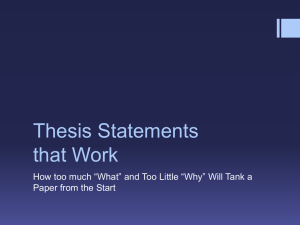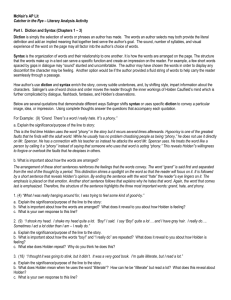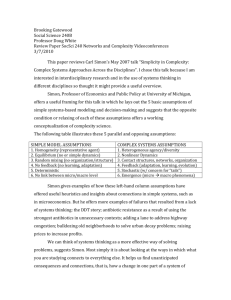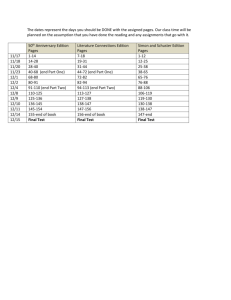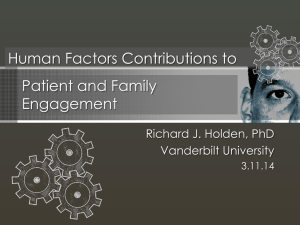Joseph Matera
advertisement
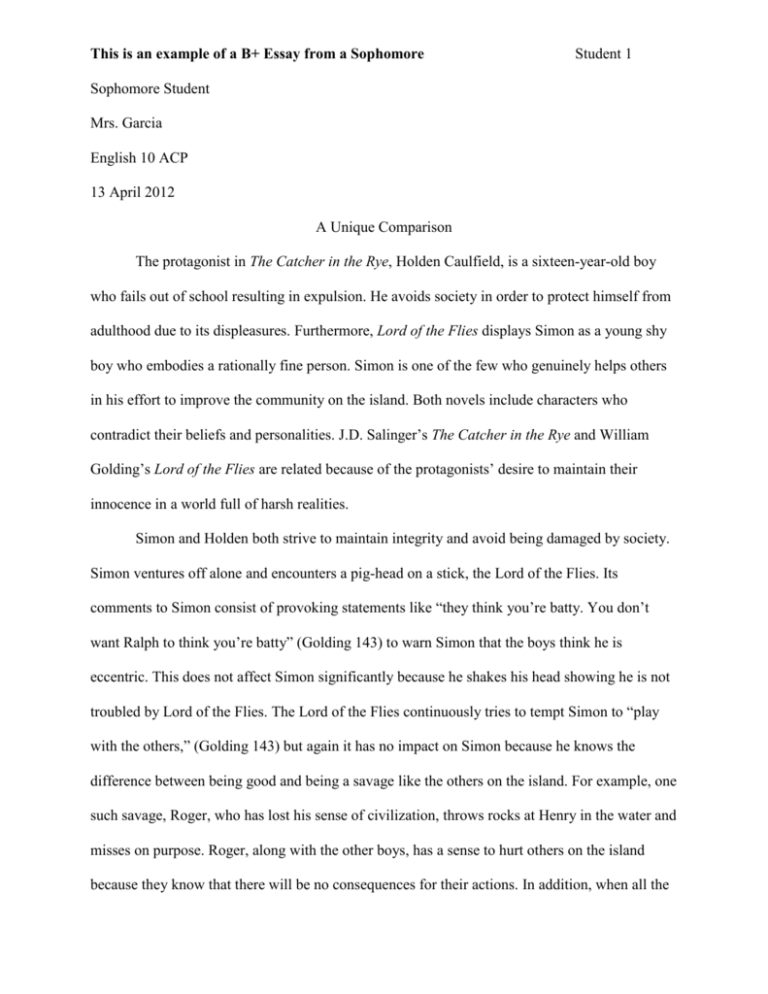
This is an example of a B+ Essay from a Sophomore Student 1 Sophomore Student Mrs. Garcia English 10 ACP 13 April 2012 A Unique Comparison The protagonist in The Catcher in the Rye, Holden Caulfield, is a sixteen-year-old boy who fails out of school resulting in expulsion. He avoids society in order to protect himself from adulthood due to its displeasures. Furthermore, Lord of the Flies displays Simon as a young shy boy who embodies a rationally fine person. Simon is one of the few who genuinely helps others in his effort to improve the community on the island. Both novels include characters who contradict their beliefs and personalities. J.D. Salinger’s The Catcher in the Rye and William Golding’s Lord of the Flies are related because of the protagonists’ desire to maintain their innocence in a world full of harsh realities. Simon and Holden both strive to maintain integrity and avoid being damaged by society. Simon ventures off alone and encounters a pig-head on a stick, the Lord of the Flies. Its comments to Simon consist of provoking statements like “they think you’re batty. You don’t want Ralph to think you’re batty” (Golding 143) to warn Simon that the boys think he is eccentric. This does not affect Simon significantly because he shakes his head showing he is not troubled by Lord of the Flies. The Lord of the Flies continuously tries to tempt Simon to “play with the others,” (Golding 143) but again it has no impact on Simon because he knows the difference between being good and being a savage like the others on the island. For example, one such savage, Roger, who has lost his sense of civilization, throws rocks at Henry in the water and misses on purpose. Roger, along with the other boys, has a sense to hurt others on the island because they know that there will be no consequences for their actions. In addition, when all the Student 2 boys play in the water, Simon is the only one who stays behind to help Ralph build the huts because shelter is more vital for survival than playing in the water. Being a twelve-year-old boy, having fun is a main priority, but not for Simon. Holden, as well as Simon, yearn to be his own person and are seen through small actions. Holden frequently wears his hunting hat to signify his difference from the others. Although Holden does not wear his hat around familiar people, it represents his desire to be an individual. According to Holden, he “[has] to come out from somewhere and catch” (Salinger 173) the boys and girls and prevent children from growing up. This expresses his longing for the role of the “catcher in the rye” (Salinger 173). Society’s ideal plan for Holden is for him to grow older and leave his childhood behind. Holden resists the plan and wishes to remain in adolescence. Holden is an individual because he does not branch out too far from his beliefs just like Simon. Another moral Holden stands by is that sex comes with a mental connection, a girl he respects and can relate to. He has the opportunity to have sex with Sunny, considering she is a prostitute, but he lacks a deeper connection with her. By sticking to his code, he refuses sexual intercourse with Sunny. Besides, Simon does not partake in the savagery with the boys, and Holden does not go against his values of life. Holden and Simon stand by and adhere to their principles. Simon and Holden both put others’ interests before their own for the good of the community. Simon’s desire to help the others survive while stranded on an island is greater than his desire to have fun. Since Simon eats before Piggy and there is a low supply of meat remaining, Simon “shove[s] his piece of meat over the rocks to Piggy” (Golding 74) showing his kind intent. Simon’s natural instinct is to be a genuinely good person. A twelve year old boy will primarily be irresponsible and selfish without hesitation by nature. Simon’s simple acts of kindness, such as reaching a fruit on a high branch for the boys, prove his overall devotion to Student 3 preserving life. Holden is not much different. In Holden’s interaction with Stradlater, he shows care for an old flame, Jane Gallagher. When Stradlater comes home from his date with Jane, Holden fights him because he receives the vibe that Stradlater tries to have sex with Jane. Holden senses this because he is protective of those he loves. He believes men should develop a respectful relationship with someone before proceeding with sexual intercourse. Stradlater does not possess that attitude towards women. Although Holden cares about others that pertain to his morals, and Simon cares for the boys and overall life, they both possess a sense of concern towards others. Holden and Simon both withdraw from society to avoid being corrupted by the people around them. Simon is trapped on an island with wild boys full of fear as well as hunger for power. Since Simon is aware of the boys’ insanely evil ways to gain power, he seeks refuge in the jungle. He escapes to the open space in the jungle and “look[s] over his shoulder… glance[s] swiftly to confirm that he [is] utterly alone” (Golding 56) in his desire to stray away from the group. The boys act in animalistic ways which can be contagious. By Simon wandering off in the jungle, he is less likely to catch the contagion. By staying away from the boys, Simon allows himself to remain true to his ideals. Likewise, Holden lives with Stradlater, a boy who causes conflict with him, and Holden makes it clear to readers that he opposes his behaviors. Holden is trapped in childhood due to his continuous defiance of adulthood. Both boys alienate themselves so dealing with overbearing ways of other people does not have to be dealt with. Simon avoids the community on the island out of his pure personality, and Holden does this in fear of surpassing adolescence. In addition to the parallels between Simon and Holden, the boys in Lord of the Flies share similarities with Holden, too. Both novels contain characters acting in contradictory Student 4 manners. Jack is a duplicitous character that reveals his true colors later on, “We’re strong—we hunt! If there’s a beast we’ll hunt it down!” (Golding 91) However, once the naval officer shows disappointment and doubt in the boys, Jack “[gives] himself up to them on the island for the first time” proving that he is not man enough to own up to his own mess. They are too naive to face the fact that the beast is inside them. The beast in the boys is their fear of each other. The beast inside Holden is the urge to have sex; conversely, he criticizes people for being too sexual. He calls guests at the hotel perverts for cross dressing and spitting at each other. Then, he claims he likes what he sees but at the same time it bothers him. Holden is basically calling himself a pervert. The boys and Holden are hypocrites to their lives because they cannot realize they exemplify the actions that they claim they are against. Simon and Holden’s true actions exhibit the natural good in people even though both characters detach themselves from the dishonest society. It proves that two boys from totally opposite worlds can act in similar fashions. Additionally, readers can relate to the actions of Holden and Simon because of how these boys preserve to stay true to their own beliefs and morals and do not mold into society. In constant change in environments, both boys are untouched by influence and human nature allowing the reader to realize how intertwined their personalities are to their values. Teacher Notes: This essay scored a B+ On a scale of 1 to 6 in each category, for a maximum total of 24, the student scored 20, broken down as follows: Thesis or Controlling Idea: 5 Evidence and Text Support: 5 Ideas, Extension, and Elaboration: 5 Organization, Mechanics, and Style: 5 The essay was strong overall. However… Student 5 The writer does use transition words; however they don’t flow smoothly. For example, the student uses “furthermore” when “similarly” or “on the other hand” would be more appropriate. Essay contains some minor grammar issues: a few misplaced commas, one comma splice, missing period after a citation, one citation missing. Conclusion is a little confusing near the end. Teacher comments: p. 2: “Link to the ‘harsh realities’ of thesis.” p. 3: “Give an example of Holden flunking out of school, not going home right away, or opening up to no one except Phoebe.” p. 4: “Is it, or is the beast the EVIL inside?”


